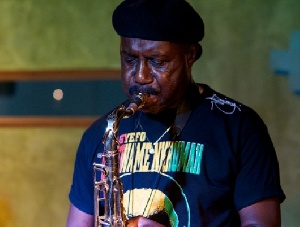Veteran Ghanaian musicians and song writer Gyedu Blay Abolley has said he has been losing the MUSIGA presidential elections to Bice Osei Kuffour, known popularly by the name ‘Obuor’ due to ‘mafia’ tactics employed by his opponents against him, and, has, therefore, described the election process as undemocratic.
MUSIGA is an umbrella group that unites all musicians in Ghana. Ambolley has lost the MUSIGA presidential race to Obuor twice – 2011 and 2015.
Speaking on Entertainment Capital on Accra 100.5fm Saturday, May 14, Ambolley said ‘mafiarism’ and the undemocratic nature of MUSIGA elections are the bane of Ghana music.
“When the late Joe Mensah was there, the election was open to every musician to vote. During Sidiku Buari’s era, he selected 10 musicians from each region as delegates. Those 10 musicians from each region selected as delegates could easily be bribed and that has been continuous and these are the things that I speak against. The elections must be open and more democratic for every musician to be eligible to vote”, he told host DJ Premier adding that: “When the electorate are many, you cannot bribe them all”.
The "Simigwa Do Man" said MUSIGA elections have been characterised by bribery from Sidiku Buari’s era to now.
He noted that during his tenure as vice president of MUSIGA from 1979-1987 with Agya Koo Nimo as president, their election was more democratic.
“We pioneered MUSIGA with Jerry Handson, the leader of Rumblers and the late Kofi Ghanaba. We started to put the structures in place. A lot of people use people’s music for commercial purposes without compensating the musicians, so, we were putting structures [in place] to address those things, but it was not easy because there was also the 1979 coup which affected our work.
“During our time, elections were open to all musicians unlike this time where 10 musicians are selected from each region.
“With the state of music now, children will choose becoming professional footballers over being musicians because our legendary musicians are still wallowing in poverty. The structures are not there to assist them, but their music is still being used for commercial purposes,” he lamented.
“If MUSIGA is for the welfare of musicians, then the welfare part should be taken seriously because government gave us GHS2 million; what have they done with the money? Musicians are crying musicians are poor up till today”.
Ambolley, however, admitted that some structures have been put in place with appropriate documentations presently “but implementation has become a problem”.
Entertainment of Sunday, 15 May 2016
Source: classfmonline.com

















